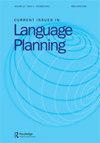荷兰的双语日托:双语输入和潜在意识形态的实施分析
IF 1.8
1区 文学
Q2 EDUCATION & EDUCATIONAL RESEARCH
引用次数: 5
摘要
本文分析了荷兰学前教育系统实施双语教育的动机,并将其与荷兰语在荷兰教育系统中的地位联系起来。基于对政策文件和家长和教师填写的问卷的分析,本研究揭示了政府、日托机构和家长采取的两种不同的潜在意识形态。荷兰语观众访问的荷兰政府和日托组织的意识形态集中在荷兰语儿童将英语作为外语的学习上。另一方面,国际观众访问的非荷兰语家长和日托组织更希望让非荷兰语儿童接触荷兰语,以促进更好地融入荷兰社区。因此,数据表明,对许多父母来说,不仅英语很重要,荷兰语也很重要。尽管如此,双语日托的引入是荷兰教育体系持续“英国化”的一部分,这一进程已经持续了几十年。未来的研究应该确定从长远来看,更大规模的引入对荷兰语在荷兰学前教育系统中的地位意味着什么。本文章由计算机程序翻译,如有差异,请以英文原文为准。
Bilingual daycares in the Netherlands: an analysis of the implementation of bilingual input and underlying ideologies
ABSTRACT This paper analyses the motivations behind the implementation of bilingual education in the Dutch preschool system and relates this to the status of Dutch in the Dutch educational system. Based on the analysis of policy documents and questionnaires filled in by parents and teachers, this study reveals two different underlying ideologies that the government, daycares and parents have adopted. The ideology of the Dutch government and daycare organizations visited by a Dutch-speaking audience is centered around Dutch-speaking children acquiring English as a foreign language. On the other hand, non-Dutch speaking parents and daycare organizations visited by an international audience rather want to expose non-Dutch speaking children to Dutch, to facilitate better integration into the Dutch community. The data thus suggest that not only English but also Dutch is important for many parents. Still, the introduction of bilingual daycares is part of an ongoing ‘Englishization’ of the Dutch educational system that has been taking place for decades. Future research should determine what a larger scale introduction means for the status of the Dutch language in the Dutch preschool system in the long run.
求助全文
通过发布文献求助,成功后即可免费获取论文全文。
去求助
来源期刊

Current Issues in Language Planning
Multiple-
CiteScore
4.80
自引率
16.70%
发文量
26
期刊介绍:
The journal Current Issues in Language Planning provides major summative and thematic review studies spanning and focusing the disparate language policy and language planning literature related to: 1) polities and language planning and 2) issues in language planning. The journal publishes four issues per year, two on each subject area. The polity issues describe language policy and planning in various countries/regions/areas around the world, while the issues numbers are thematically based. The Current Issues in Language Planning does not normally accept individual studies falling outside this polity and thematic approach. Polity studies and thematic issues" papers in this journal may be self-nominated or invited contributions from acknowledged experts in the field.
 求助内容:
求助内容: 应助结果提醒方式:
应助结果提醒方式:


